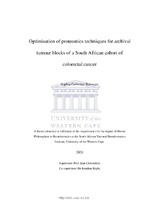| dc.contributor.advisor | Christoffels, Alan | |
| dc.contributor.advisor | Rigby, Jonathan | |
| dc.contributor.author | Rossouw, Sophia Catherine | |
| dc.date.accessioned | 2021-03-25T08:42:35Z | |
| dc.date.available | 2022-01-01T22:10:06Z | |
| dc.date.issued | 2020 | |
| dc.identifier.uri | http://hdl.handle.net/11394/8036 | |
| dc.description | Philosophiae Doctor - PhD | en_US |
| dc.description.abstract | Tumour-specific protein markers are usually present at elevated concentrations in patient biopsy tissue; therefore tumour tissue is an ideal biological material for studying cancer proteomics and biomarker discovery studies. To understand and elucidate cancer pathogenesis and its mechanisms at the molecular level, the collection and characterisation of a large number of individual patient tissue cohorts are required. Since most pathology institutes routinely preserve biopsy tissues by standardised methods of formalin fixation and paraffin embedment, these archived, FFPE tissues are important collections of pathology material, often accompanied by important metadata, such as patient medical history and treatments. FFPE tissue blocks are conveniently stored under ambient conditions for decades, while retaining cellular morphology due to the modifications induced by formalin. | en_US |
| dc.language.iso | en | en_US |
| dc.publisher | University of Western Cape | en_US |
| dc.subject | Formalin-fixed paraffin-embedded (FFPE) proteomics | en_US |
| dc.subject | Colorectal cancer (CRC) | en_US |
| dc.subject | FFPE archival tissue | en_US |
| dc.subject | Protein extraction protocol | en_US |
| dc.subject | Protein purification methods | en_US |
| dc.title | Optimisation of proteomics techniques for archival tumour blocks of a South African cohort of colorectal cancer | en_US |
| dc.rights.holder | University of Western Cape | en_US |

